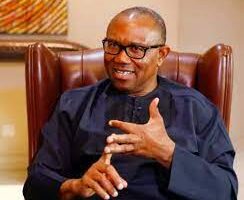Chamba Simeh
Last week’s inauguration of the Presidential Jobs Board by President Goodluck Jonathan underscores the cataclysmic social liquidation the high unemployment rate could wreak on Nigeria if allowed to fester. This is coupled with the fact that the board, mandated to create three million jobs in the next 12 months, is headed by no less a personality than Vice President Mohammed Namadi Sambo. Although this is a probable fall out of the 24th World Economic Forum on Africa (WEFA) held in Abuja from 7 – 9 May 2014, it bears reiterating that the job board is just one of the several efforts by the federal government to slow down the geometric rise in unemployment, particularly among the youth.
Incidentally, President Jonathan has always found the architectural skills of his deputy a portent tool to deal with the unemployment monster. Sambo has also been given charge over Nigeria’s quest for stable electricity supply, which is globally believed to hold the key to national industrialization and economic buoyancy and by implication massive job creation. But has the vice president lived up to his billings?
This is a knotty poser for which a straight answer could miss the point and give the lie of a witch-hunt, especially given the complexities, peculiarities and oddities embedded in the Nigerian factor. Suffice to say, however, that the bucks ought to stop on the leader’s table; it would then be safe to reach the irrebuttable conclusion that Nigeria has been unable to make a success of its agenda on uninterrupted power supply despite the implementation of radical reforms and the sinking of several trillions of dollars into the beleaguered power sector. The federal government’s programmes aimed at job creation have also been more of polemics and rhetorics than empirical, no thanks to endemic corruption and leadership by deceit.
President Jonathan poignantly stated at the inauguration ceremony: “Let me charge departments and agencies of government that have been training people over the period, like SMEDAN, ITF, PTDF, NDE, NIMASA, Women Affairs and other agencies that do that as a part of their responsibility, to train young men and women in acquiring different skills. There is a missing link, because there is a difference between training people to acquire skills and job creation. I have observed over a period that agencies of government are more interested in training.
“But my conviction is that if you train 100 people and none of them is either self-employed or employed by any corporation that is a total waste, you are rather frustrating more people and probably increasing the number of criminals in the society. I always say that if you train a young man as a welder and he has no job, he will use that skill to break into banks, because you have trained him on how to handle iron and how to handle complicated locks.
“So if he is not employed, you have created more problems for the society. Instead of training 100 people and none of them will get jobs, train 20 and use the money for the 80 to create employment for these people. It is not just how many people you train but how many people you have given employment through that training programme.”
Sambo’s task is a tall order given the fact that the lifespan of the Jonathan government will end in the next eight months, precisely on May 29, 2015. And within this period governance will virtually be at a standstill as politicking takes the centre stage. But Sambo’s assignment may have been sliced by Dangote Group. President of Dangote Group and a member of the job board, Alhaji Aliko Dangote, said the group will invest $12 billion with a view to providing 180,000 new jobs in the country. Dangote, who is Africa’s richest man, may have been rattled by startling evidence of mayhem occasioned by the bustle of mammoth crowds seeking means of livelihood. The trampling of graduate job seekers to death during stampedes at Nigeria Immigration Service (NIS) recruitment drive across the country in May, presents a graphic picture of the problem.
But Dangote was to be confronted first hand with a more embarrassing scenario: Dangote Group sought to employ 100 drivers in 2012. Guess what? The company received 13,000 applications. But that is not the news. The shocker is that, of the 13,000 applicants six were PhD, 704 Master and over 8,460 Bachelor degree holders. Dangote also believes that mass unemployment was a major cause of the Boko Haram insurgency.
Nonetheless, Sambo, who has a greater stake in the Nigerian project, must ensure that the three million job target is achieved. The vice president should, however, shun the temptation of the misnomer and make-believe of the gullibility of Nigerians as demonstrated by the falsehood peddled by the Finance and Coordinating Minister of the Economy, Dr Ngozi Okonjo-Iweala, to the effect that the federal government created 1.6 million jobs in 2013. Sambo’s report card should also avoid the pitfalls of the National Bureau of Statistics (NBS) which rebasing rates Nigeria’s economy as the first in Africa in defiance of its inherent weaknesses.
As a politician desperate to retain his seat beyond 2015, Sambo’s stakes are certainly high.



